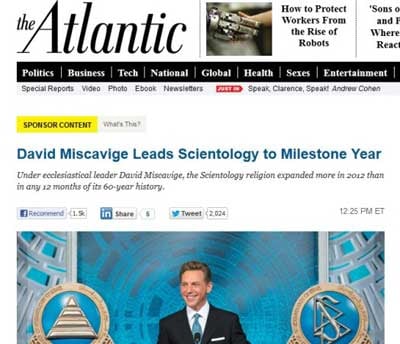
There was a pretty strong, immediate and almost entirely negative reaction to a recent article posted at the website of the Atlantic. The headline–”David Miscavige Leads Scientology to Milestone Year”–probably tipped readers that something was more than a little off.
But it wasn’t an article, really; above the headline, in a yellow box, was the phrase “Sponsor Content.” In this case, obviously, the sponsor was the Church of Scientology.
The Atlantic’s decision rubbed plenty of people the wrong way, judging by the stream of can-you-believe-this Twitter comments. And that probably has something to do with both the prestige of the Atlantic and the dim view most people take of Scientology.
But aside from that, how shocking is this really? The Huffington Post regularly runs sponsored content on its home page–ads, in other words, that look just like the rest of the columns. The Forbes website, as the New York Post reported, runs “stories” very much like the Atlantic’s:
Through Forbes BrandVoice, writers who are paid by advertisers can also submit articles. About a dozen marketers, including Microsoft, Dell and Oracle, use the program, which was called Forbes AdVoice before it was rebranded this month.
On television news, the tendency is to promote the bosses’ other interests. The L.A. Times’ Joe Flint recently reported (1/11/13) that NBC was using its 30 Rock Rock Center newsmagazine to promote an NBC comedy. The correspondent on the piece, Flint mentioned, was George W. Bush’s daughter Jenna Bush Hagar. CBS Evening News (1/8/13) recently promoted its new 60 Minutes Sports program that airs on Showtime. And a few weeks ago, Disney-owned ABC’s Good Morning America somehow managed to score an exclusive first look at… some new attractions at DisneyWorld.
The flipside of promoting your own business interests is stuffing things that might harm the parent company. The technology website CNET was about to announce that it had selected a device called the Hopper for an award at the Consumer Electronics Show. The Hopper lets users skip commercials. Who wouldn’t like that? TV networks, for starters–and CNET happens to be owned by CBS. The network suggested the site not give kudos to a company that CBS is currently suing. And so, as Brian Stelter (New York Times, 1/14/13) reported:
When it announced the winners on January 10, CNET acknowledged that the Hopper was “removed from consideration due to active litigation involving our parent company.”
The corporate meddling caused one CNET writer, Greg Sandoval, to resign, saying that he doubted that “CBS is committed to editorial independence.”
In other words, these kinds of arrangements happen all the time–as FAIR has been documenting in our Fear & Favor reports for over a decade. And this doesn’t even address the private, corporate sponsored events that outlets like the Atlantic convene. The Washington Post does this as well, and turns the corporate-backed meetings into news features–sometimes without telling readers what’s going on.
And Slate–owned by the Washington Post–is currently running an energy series sponsored by an oil and gas company. Surely Slate would tell you that the sponsorship in no way whatsoever affects the content–just like the pro-fracking natural gas ads on the network newscasts are just like any other advertisements, and have nothing whatsoever to do with the remarkably positive coverage of the natural gas industry on the very same newscasts.
So is what the Atlantic did–and quickly apologized for–unusual? Not really. The fact that the sponsor is a religious cult that harasses journalists makes the arrangement unseemly, for sure. But is journalism underwritten by weapons manufacturers or giant oil companies all that different?
Our most important fundraising appeal of the year
December is the most critical time of year for Truthout, because our nonprofit news is funded almost entirely by individual donations from readers like you. So before you navigate away, we ask that you take just a second to support Truthout with a tax-deductible donation.
This year is a little different. We are up against a far-reaching, wide-scale attack on press freedom coming from the Trump administration. 2025 was a year of frightening censorship, news industry corporate consolidation, and worsening financial conditions for progressive nonprofits across the board.
We can only resist Trump’s agenda by cultivating a strong base of support. The right-wing mediasphere is funded comfortably by billionaire owners and venture capitalist philanthropists. At Truthout, we have you.
We’ve set an ambitious target for our year-end campaign — a goal of $250,000 to keep up our fight against authoritarianism in 2026. Please take a meaningful action in this fight: make a one-time or monthly donation to Truthout before December 31. If you have the means, please dig deep.